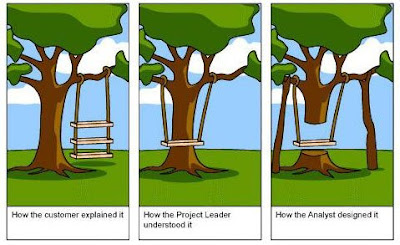Friday, December 19, 2008
What do you picture when you hear the word MENTOR? Perhaps someone older than you? Someone with more seniority? More knowledgeable in your field?
What about someone fresh out of college, full of creativity, fresh ideas, and exploring the latest in technology and innovation? What about a friend with a particular aptitude for building relationships and networking? Or a colleague known for a positive management style?
True mentors do not fit into any preconceived mold. They can be anyone who possesses a quality or skill that you would like to improve upon. They can be younger than you, much older, less experienced, more educated, or even working in a completely different field than your own.
Leaders are on a constant quest to improve upon themselves, and recognize that they can learn from a variety of individuals. Don't be afraid to reach out and mentor someone with a different background from you, and don't be surprised when you learn quite a bit from that person, as well.
Labels: diversity, leadership, learning, mentoring, relationships
Thursday, December 18, 2008
 I don't remember where I found this image, but it's true on so many levels. Communication = Perception.
I don't remember where I found this image, but it's true on so many levels. Communication = Perception.
Remember that everyone receives messages through their own frames of reference (culture, past experience, education, lifestyles... etc), so what you think you're saying may not be what they're hearing. Figure out their frames, and then alter your message to fit.
Labels: communication, fun 'n games
Friday, December 12, 2008
Times are changing, folks, and it impacts more than just your 401k and investments. This economic slowdown is more than the failure of our banking system and credit markets. This failure is signaling major changes that will affect all functions of business.
Here's an excerpt from Thanksgiving, The Economy, and Recruiting by Kevin Wheeler (posted on ere.net on Nov. 26, 2008).
The Depression of the 1930s redefined the agriculturally-based banking and finance world and made it competitive and efficient for an industrial age.
We are now in a similar period.
The nature of business and work is rapidly evolving. Organizational structure will become less hierarchical, more nimble, and flexible. Employees will begin to be treated with respect as investors — not assets or human capital. People are the most precious of success factors, and we each choose to invest our time and skills in an organization that respects and listens to us. When we are not respected, we move on. Entrepreneurship has grown rapidly in response to the lack of respect innovative employees have been given.
Look to see the finance system change to reward innovation. Look at small organizations with a global network or loosely allied suppliers and partners to dominate the economic climate of this century. It is the end of GM and other large, hierarchal organizations that were the model of efficiency in an industrial age.
Many of us will miss the familiarity and the rules of the past that gave us a sense of security and certainty. But surely this economic meltdown must signal to the most conservative of believers that times are changing.
Indeed, even our profession [recruiting] is changing fundamentally, although we are just beginning to see and understand those changes. The habits and skills we developed in a slower-moving, more certain 20th century no longer work so well. Our cheese has been moved, as the eponymous book says, and we will miss the familiar world of job boards, resumes, face-to-face recruiting, ringing telephones, cold calls, and classified ads. Technology and the Internet still feel unfamiliar and foreign to many recruiters, but we have entered a technology-dominated, virtual era.
Read More about the implications on recruiting talent.
Labels: change, innovation, recruiting
